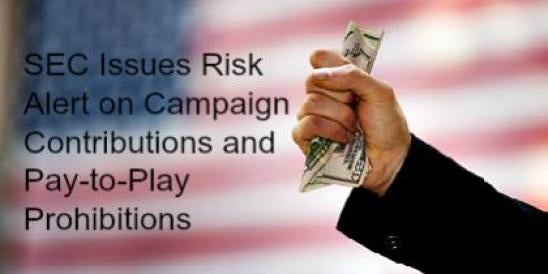At the beginning of the Labor Day holiday and in the heart of the campaign season, the SEC's Office of Compliance Inspections and Examinations issued a Risk Alert targeting compliance by investment banks underwriting municipal bonds with rules limiting political contributions to campaigns of state and local government officials who select firms to be underwriters, remarketing agents, and financial advisors for municipal securities. The Risk Alert is a reminder of existing rules; no new requirements were announced.
The Risk Alert should be of particular interest to:
- Candidates for state or local government office and their campaign staff, and candidates for federal office currently holding state or local government office; and
- Municipal finance professionals and their firms.
For Candidates
The Risk Alert serves as a reminder to candidates for state and local government office and candidates for federal office who are current state and local elected officials of federal rules that restrict contributions by potential donors to your campaign if (1) those potential donors are firms or certain of their employees that underwrite, act as remarketing agent, or serve as financial advisors for municipal bond offerings and (2) the state or local office you seek or currently hold involves you in the selection of firms for such work. Penalties on contributors are so severe that when made inadvertently, contributors will usually seek return of the contribution.
Municipal Securities Rulemaking Board (MSRB) rule G-37 generally prohibits firms from serving as underwriters, remarketing agents, or financial advisors for an issuer of municipal securities for two years after making a campaign contribution to an official of the issuer who awards or may influence the award of such assignments unless the contribution is no more than $250 per election cycle and the contributor is entitled to vote for the official (the “de minimus exemption”). In addition, such firms and their covered employees, known as municipal finance professionals, are prohibited from soliciting campaign contributions and providing other services for the campaigns of such officials.
The consequences of violation of rule G-37 are serious. One consequence is known as “the death penalty”: firms that act as an underwriter after a covered employee makes a contribution not subject to the de minimusexemption are typically required in SEC enforcement actions to forfeit the gross revenues received from all underwritings for the issuer in the two-year period following the contribution. If the contribution was made inadvertently, firms that discover, report, and recover the contribution may seek – but are not automatically assured of – relief from the death penalty.
Candidates and their campaign staff may wish to be alert to this regulation and avoid accepting contributions which will later need to be reimbursed.
For Municipal Finance Professionals
The Risk Alert serves as a reminder of MSRB rules in place since 1994 on campaign contributions applicable to brokers, dealers, and municipal securities dealers and their municipal finance employees active in municipal securities markets. The Risk Alert specifically intends to call the attention of municipal firms to compliance concerns of SEC staff observed during their examinations, including:
- Compliance with the two-year ban following a political contribution by a municipal finance professional beyond the de minimus exception;
- Potentially deficient record-keeping;
- Failure to file accurate and complete forms G-37 with the MSRB; and
- Inadequate supervision.
The Risk Alert also identifies practices that certain firms have taken with respect to avoiding pay-to-play practices, including:
- Providing training to municipal finance professionals;
- Required knowledge and compliance self-certification by covered employees;
- Use of internet and other surveillance techniques;
- Identification and restriction of employees who may become subject to rule G-37 through promotion;
- Required preclearance, restriction, or prohibition of political contributions; and
- Separation of surveillance functions to avoid any possibility of adverse action towards an employee based on political preferences.





 />i
/>i
